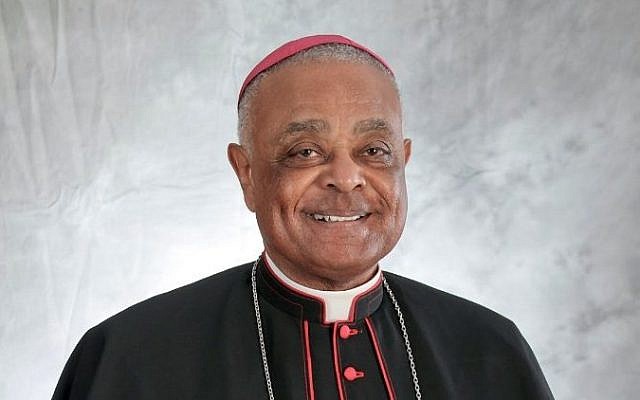Archbishop Leaves Atlanta a Legacy of Jewish Dialogue
After 14 years, Gregory is leaving the Archdiocese of Atlanta to shepherd the troubled Archdiocese of Washington, D.C.
Dave Schechter is a veteran journalist whose career includes writing and producing reports from Israel and elsewhere in the Middle East.
The first thing that comes to mind when I think of Archbishop Wilton Daniel Gregory is the Chicago White Sox.
A few years ago, I interviewed Gregory about the 50th anniversary of the Nostra aetate (Latin for “In our time”), the landmark document that officially removed the Jews from blame for the death of Jesus and rejected any support of anti-Semitism from church doctrine.
Before I asked about the past, present and future of Jewish-Catholic relations, we – a journalist raised in Chicago’s northern suburbs and a priest hailing from its South Side – talked about the baseball team we had followed growing up.
Now, after 14 years, Gregory is leaving the Archdiocese of Atlanta to shepherd the troubled Archdiocese of Washington, D.C., which covers the nation’s capital and several Maryland counties.
Troubled because Gregory is replacing Cardinal Donald Wuerl, who resigned after a grand jury report alleged that Wuerl protected sex abusers in the clergy while he was the bishop of Pittsburgh.
Troubled because Wuerl’s predecessor, Cardinal Theodore McCarrick, was defrocked in February over accusations of sexual abuse as he rose in church ranks.
If, in the future, Pope Francis elevates Gregory, the first African-American to lead the Washington archdiocese, to cardinal, he would be the first African-American to hold that position.
The 71-year-old Gregory was installed as Archbishop of Atlanta in January 2005, coming from Belleville, Ill., where he had been bishop of that diocese.
Gregory’s three years as president of the U.S. Conference of Catholic Bishops, beginning in November 2001, included the burgeoning scandal of sexual abuse of minors by priests.
[Note: The Atlanta archdiocese in November released the names of 15 priests and other religious figures accused of sexual abuse of a minor, in the years since Atlanta became a diocese in 1956.]
Dov Wilker, regional director of the AJC in Atlanta, called Gregory “a great friend to the Jewish community of Atlanta and a real leader in the Atlanta community.”
“Together we have spoken about immigration, racism, anti-Semitism and the need to strengthen unity within our community. While we are sad that he will be departing Atlanta, we couldn’t be happier for him and for the Archdiocese of Washington,” Wilker said.
In our conversation about the deicide charge that had plagued the Jewish people for two millennia, Gregory referenced his dual identities.
“I sit here talking to you as a Jew, as a Catholic. But I want to switch hats. I’m an African-American man and you’re a Caucasian man. My people endured slavery and so the question of how do we look at our past, acknowledge it and what constitutes an appropriate ‘mea culpa.’ … We certainly do have to apologize,” he said.
Gregory also served for three years as the moderator of Jewish affairs for the Bishops’ conference.
Asked about Jewish-Catholic relations in Atlanta, Gregory said, “From my humble experience, I’d like to say they are good, they’re thriving. I wish they were richer. Because it’s one thing for me as the archbishop to speak with my dialogue partners in the Jewish community. It’s another thing for the local communities, for the local pastor and the local rabbi to know each other and to be friends. So, the dialogue exists on that official level of the official authorities and then on the local level of the neighbors and the local pastors.”
Gregory acknowledged that there remained bumps in the road, despite the “solid foundation” laid by his predecessors and their Jewish interlocutors.
“I think it would be our evaluation of the situation in Israel with the Palestinians and the Israeli government, because many of the Palestinians, or some of the Palestinians, are Christian. And so we’ve got to keep talking to each other about how we can respect Israel’s right to a national identity as well as the rights of the Palestinian people to a homeland. That’s a big bump,” he said.
As the interview concluded, Gregory said, “I am very proud … and very encouraged by the level of dialogue, friendship, interaction, collaboration that we in Atlanta have with our Jewish brothers and sisters. It could be strengthened; it should be strengthened; I hope it will be strengthened, but I give great thanks for its intensity and its vibrancy today.”
Washington’s Jewish community can look forward to Gregory’s desire for dialogue.




comments